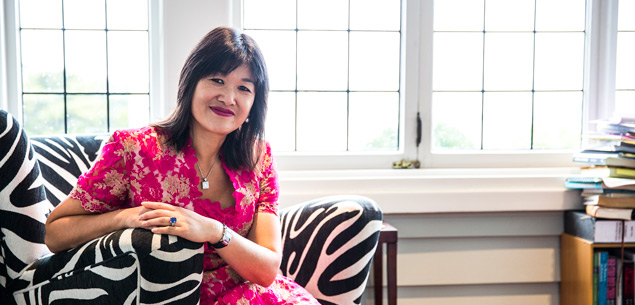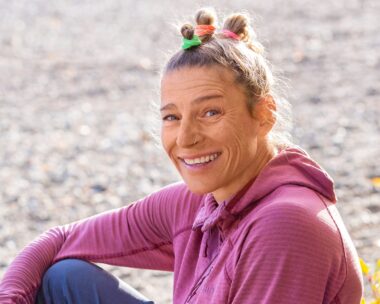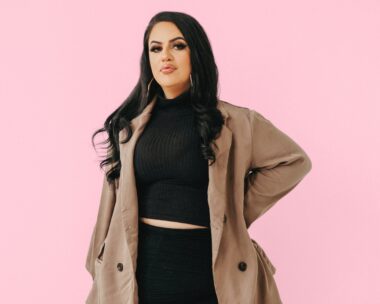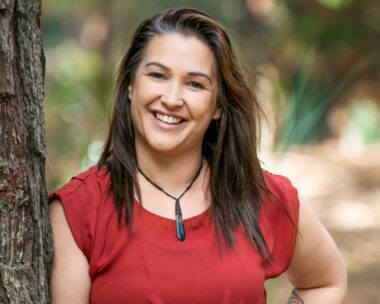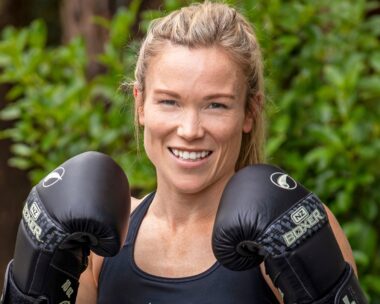The interview with Mai Chen, one of New Zealand’s most high-profile lawyers, had been set up for weeks. Mai had slotted me into her Friday afternoon, and I knew I would be taking up valuable time between important corporate clients of her law firm Chen Palmer.
And then I forgot. I was immersed in a proofreading project at home in front of the fire when the phone rang. It was one of her staff, reminding me of our meeting quarter of an hour earlier.
I made it there in 15 minutes, still dressed in my tatty jeans and jumper with no make-up on, but at least I remembered to swap my slippers for boots. As I stumbled from the lift into the palatial office suites of Chen Palmer, I knew I had one thing in my favour. Our interview was about Mai finding some serenity in her life, slowing down, and changing her focus from busy, 16-hour-a-day lawyer, to a woman living a more sane, fulfilled existence. “Surely she’ll go easy on me,” I thought, hopefully. “Serenity and all that.”
As I waited in her boardroom, looking at the sushi and green tea which had been thoughtfully ordered and left sitting there for 30 minutes, I checked my nails for dirt from the garden and ran my fingers through my hair in an attempt to look groomed. Before long, Mai breezed through the door, immaculately dressed and groomed in a green silk top, teamed with a trim black skirt, stockings and high shoes to match. Not a hair was out of place.
I murmured apologies, she smiled graciously. “You know what, I had back-to-back meetings all day, so you gave me half an hour to myself,” says Mai. “Phew,” I thought. “Serenity actually rules.” But, as we talked, I realised it wasn’t so much serenity I had to thank for my benevolent reception, but some of Mai’s harassed clients fighting over a will and a Buddhist little bird. Both were responsible for changing Mai’s life.
“I had a wealthy client whose parent had died, and I ended up sitting at a table where every single child in that family had their own lawyer. The surviving parent had one too, and they were all there, arguing over the money of the deceased client,” says Mai. “It was highly unpleasant – I actually had an out-of-body experience. I saw my husband, son, mother and sisters all fighting over my money. “I went home and looked at my will – it was 12 years out of date,” she adds.
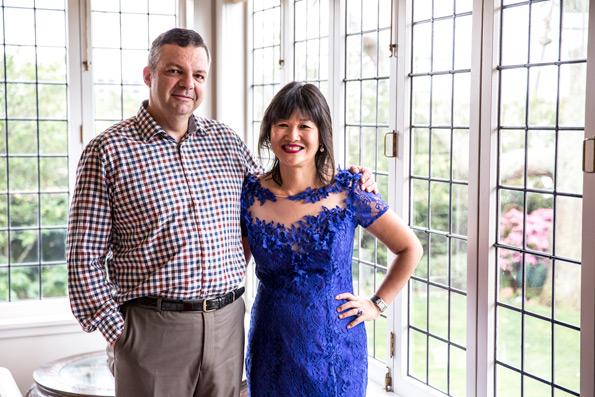
Husband John is thrilled that his wife is spending more time with him and their son Jack. PhotoTodd Eyre
Mai set about planning for her death from that day and unleashed the power to change the way she was living, much to her surprise. “I had these demented conversations with my husband. I said to him, “You know hon, if you died, I would just stop working.’ And he said to me, ’That’s ironic, because I’m alive and you’re never here.’”
Mai has been married to her first boyfriend, author Dr John Sinclair, for 27 years, and they have a 10-year-old son Jack. She has always desperately wanted to work less, but could never find a way. Then things slowly began to change. As she thought about her death and started considering her will, Mai began to feel “the claws of the little bird on my shoulder”.
“Buddhists say that every morning when you wake up, you ask the little bird on your shoulder, ‘Is today the day I will die?’” says Mai. “And if the little bird says, ‘No, not today,’ then you go off and do all the things you would otherwise have done as if it was your last day.”
That little bird soon became the impetus behind a new website she has set up, called willtolive.co.nz. The site is designed to help people not only plan their own wills, but also view videos of interviews Mai has conducted with people such as Va’aiga Tuigamala, Olympic medallist Barbara Kendall, Sir Bob Harvey, Sir Ray Avery and Annah Stretton about life and death. You can also use a tool to create your own bucket list.
“Finally, there is a personal place, where you can put your will and write letters to everybody you love,” says Mai. “Palliative care nurses will tell you that people say on their deathbed, ’I wish I’d done what I wanted to do, not what everyone expected me to do.’
“When people find out they are dying, they rush around like a mad thing trying to do all these things, like talking to an estranged sister, feeling the wind on their face, rushing off to Kathmandu to climb a mountain. “Why not do these things now? Why not give the people you love some money today, so you can see the delight and joy it brings them? Why wait until you are dying?”
Mai found herself making big life changes the more she thought about her mortality.
She moved her family to Auckland, because she always wanted to live there. She also wanted to know what it would be like to have two dogs, so they got a puppy. And, most importantly, she changed the way she works. “I used to be very disciplined and make myself wake up at 6.30am, try to exercise while half asleep, then rush off to work without breakfast.
“These days, I wake up when I feel like it, go on my computer and do a bit of work. I might have a run or a walk, and then I head into the office.” For the first time in her life, Mai is doing yoga with her husband, who happens to be an instructor. She also had her first massage the other day, and felt empowered that she was doing something for herself.
But the biggest lifestyle change has been the time she now spends with her son, Jack.
“Last night, I was supposed to be out with clients at a concert and my little boy was going to have two babysitters. One for after-school and one at night, because John was busy. “I didn’t go to the concert and we walked the puppy, had chocolate ice cream with meringues, and watched television. Admittedly, I was still dealing with a client in crisis on the phone, but I had fun at home with my son.”
Mai begins to talk about two miscarriages – before and after Jack’s birth – and the composed, tough-talking lawyer suddenly seems very fragile. “My miscarriages were hugely painful and difficult experiences,” she says. “The worst thing with my second miscarriage was spending six weeks knowing something was wrong, but the doctors couldn’t be sure what to do. It unfortunately coincided with Chen Palmer’s 10th anniversary and we’d invited 800 people. “I should have been brave and said, ‘I can’t do this now,’ but I didn’t. My law partner asked me what was wrong. When I told him, he said, ‘Oh God, you’re not still trying, you’re so hopeless at it, you should just give up.’”
It was hardly surprising, then, that Mai suffered from postnatal depression for nine weeks – not helped by the fact that after the disastrous conversation with her law partner, she never talked about it to anyone at work. “If I could have recorded somewhere that this happened to me, to acknowledge those two little babies, I think it would have helped.”
And so the website is there for people to do just that. The highlight of Mai’s day now is when she lies down on her son’s bed and talks with him before he goes to sleep. She came home early from a client dinner one evening to say goodnight, still dressed in her finery, but without her stilettos. And her husband is enjoying discovering the new person his wife has become.
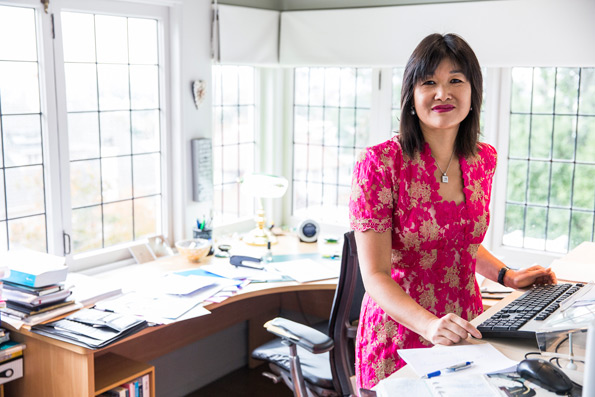
PhotoTodd Eyre
“I’m the only one who made me work 16 hours a day. Now I see the hope in my spouse, because I’m doing all these things for the first time. “The world has transformed and nothing else has changed, except how I view everything,” says Mai. The family is creating their own bucket list, which includes travelling to the Olympics in Rio and taking a year off together, but the biggest benefit seems to be in Mai herself.
She tells me about a day recently when she cancelled meetings in Christchurch, and instead spent the morning at home with John, played with the puppy, went for a run and listened to Katy Perry. She then went to the office wearing her favourite green leather miniskirt and new boots. “I had no meetings, I didn’t need to look serious,” she says.
“Just thinking about death helps me to let it all go. The power of understanding that you’re going to die is so clarifying for me. I have no issue saying no, because I say to myself, ‘If you were going to die tomorrow, or at the end of the year, would you feel good about doing this?’ And if the answer is no, then I say no.”
Mai hopes that her website connects with many in New Zealand, who will not only plan for their death, but live a better life because of the process. “If it can happen for me, it can happen for other people.” I left Mai’s office not feeling at all bad about my dishevelled appearance, or my rudeness at being late for the interview.
I went home, put my slippers back on and sat in front of the fire. I started thinking about death and that little bird on my shoulder.
So, I cancelled going out that night and sat on the couch with my husband and drank some wine.
Photos: Todd Eyre
